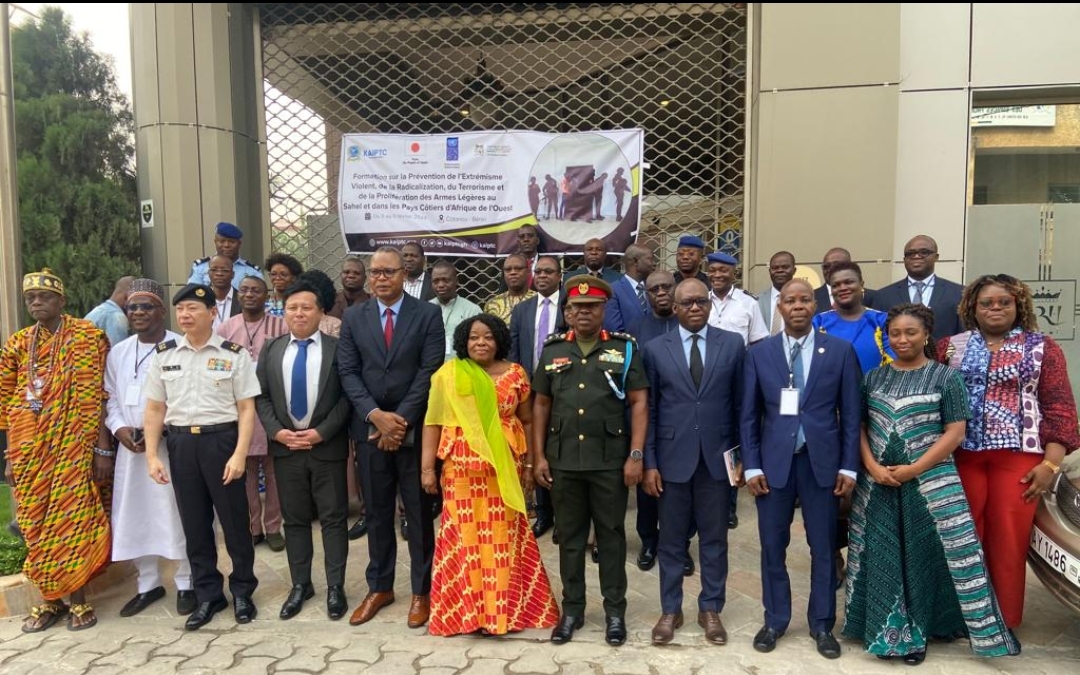The Kofi Annan International Peacekeeping Training Centre (KAIPTC), in collaboration with the United Nations Development Program (UNDP) and Japan, have organized a training program for the Republic of Benin, to contribute to improving knowledge, enhance collaboration and information sharing among security personnel, stockpile managers and armorers.
The training course held on Monday 5 February 2024, at the Benin Royal Hotel, Cotonou, dubbed: “Preventing Violent Extremism, Radicalization, and Small Arms Proliferation in the Sahel and Adjoining Coastal States in West Africa”, for 28 participants from state security and civil society organizations, also aimed at strengthening the role of civil society, in preventing violent extremism and terrorism (VET), and small arms proliferation, diversions and trafficking.

Delivering the opening address, the Commandant, KAIPTC – Major General (Maj Gen) Richard Addo Gyane said, it is a capacity development training course that forms part of the partnership between the Government of Japan, the UNDP and KAIPTC, in an endeavour that seeks to contribute to improving knowledge and information-sharing, among security personnel and civil society actors.
He continued to say that the project employs capacity development, training of trainers, research, a regional policy and experience-sharing seminar, to support existing interventions such as the Accra Initiative, in preventing and countering VET, small arms proliferation, diversions and trafficking, in Benin, Burkina Faso, Cote d’Ivoire, Ghana, Mali, Niger, and Togo, in supporting national initiatives, and to contribute to security improvement.
Providing a justification for the project, Maj Gen RA Gyane said in 2007, West Africa accounted for 1% of terrorism deaths, globally, however, by 2023, this figure skyrocketed to 43%, with violent extremists groups moving progressively from Mali to Burkina Faso, and accounting for 58% of all VET attacks in the Sahel.

Such activities, he continued to say, are spreading gradually to littoral countries, such as Cote d’Ivoire, Benin, and Togo, with increasing concerns about its potential expansion towards Ghana.
The Commandant was emphatic that the expansionist drive of VET and other transnational organized criminal groups, is made possible through the proliferation of Small Arms and Light Weapons (SALW) floating across West Africa, as VET groups use weapons from looted military barracks in Mali, Niger, Burkina Faso and stockpile leakages from mines.
He thus stated that there requires interventions such as the training program, to bridge knowledge on improving stockpile management, prevent diversions and trafficking of weapons from government stockpiles, to reduce the further spread of VET across the region.
The Chargé d’Affaires, Japan Embassy, Benin – His Excellency (HE) Mr Ichijo Motonobu, said the deteriorating security situation in the Sahel, combined with the spread of VE to coastal countries, and the porous nature of borders between countries in the sub-region, expose Benin to the risk of contagion of radicalization and VE.

He furthered that preventing VET, radicalisation and the proliferation of small arms, are therefore becoming an imperative for every country in the region, for which reason, since 2008, Japan has granted UNDP and KAIPTC financial support totalling 9,460,000 United States Dollars.
Mr Motonobu said for Japan, peace is a prerequisite for sustainable development, and that his country’s traditional commitment is to support initiatives that contribute to peace and security in Africa, a commitment which, he said, is in line with the Tunis Declaration at the 8th Tokyo International Conference on African Development, held in Tunisia in 2022.
As part of the implementation of this project, Lieutenant Colonel (Lt Col) Urakami Norihisa – a lecturer at Japan’s National Defence Academy, an expert in peacekeeping and security cooperation, was brought to Benin by Japan, to shed light, from the point of view of psychological studies, on the mechanism through which VET spreads through different communities in West Africa.
Japan’s Prime Minister – HE Mr KISHIDA Fumio, during his visit to Ghana in May 2023, announced that Japan will provide approximately USD 500 million over the next three years, to contribute to peace and stability and promote sustainable growth in the Sahel region, and the neighbouring coastal countries of the Gulf of Guinea.

The Ghanaian Ambassador to Benin – HE Madam Christine Churcher, taking her turn for a speech, said, in the last 15 years, terrorist related deaths spiked to 2000% in the Sahel alone, and that according to the Global Terrorism Index, approximately 22,074 people have been killed in terrorist attacks between 2007 and 2022.
She recalled how Benin experienced its first known attack in May 2019, when two French tourists and their local guide, were abducted in the Pendjari National Park, with recent incidents including an attack by unidentified assailants, which left about 7 people dead in Koabagou, during the night of May 1-2, 2023, around the Penjari W-Arly Park.
Present at the ceremony included the Representative of the Government of Benin, Commissioner of Police – Louis Tokpanou; Mr Alassane SEIDOU – Benin’s Minister of Interior and Public Security; The Director General, Secretariat Permanent de la Commission Nationale de lutte Contre la Radicalisation et le Terrorisme, Benin); and Lt Col U Norihisa.
